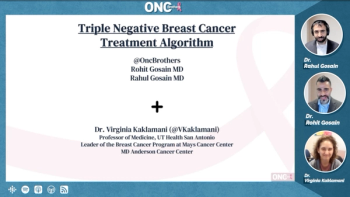Triple-Negative Breast Cancer Treatment Algorithm

Panelists discuss how triple-negative breast cancer (TNBC) is an aggressive form of breast cancer characterized by the absence of 3 key receptors: estrogen receptor, progesterone receptor, and HER2 protein. TNBC tends to grow and spread faster than other breast cancer types, presenting unique treatment challenges since common targeted therapies like hormone therapy and HER2-targeted treatments are ineffective. Standard treatment primarily relies on chemotherapy, surgery, and radiation.

Panelists discuss how locally advanced triple-negative breast cancer (LATNBC) is an aggressive breast cancer subtype characterized by absence of estrogen receptor, progesterone receptor, and HER2 protein expression. It presents with large tumors and/or extensive lymph node involvement without distant metastasis. Treatment typically involves neoadjuvant chemotherapy followed by surgery and radiation.

Panelists discusses how triple-negative breast cancer (TNBC) treatment toxicities require careful monitoring and management. Common adverse effects include fatigue, nausea, hair loss, neuropathy from chemotherapy, and radiation-induced skin changes. Health care teams employ preventive strategies, dose modifications, and supportive care to minimize complications while maintaining treatment efficacy.

Panelists discuss how the approach to metastatic disease focuses on systemic therapy, as cancer has spread beyond its primary site. Treatment typically combines targeted therapy, immunotherapy, chemotherapy, and/or hormonal therapy based on cancer type and molecular profile. Goals shift toward extending survival, controlling symptoms, and maintaining quality of life rather than cure. Regular monitoring of treatment response and adverse effects guides ongoing care decisions.

Panelists discuss how sacituzumab shows significant efficacy in triple-negative breast cancer, with improved progression-free and overall survival. It demonstrates particular benefit in pretreated patients and brain metastases cases. Trastuzumab deruxtecan (T-DXd) excels in HER2-positive breast cancer treatment, showing remarkable response rates and survival benefits, including in patients with brain metastases and those who progressed on prior therapies.


